Five Fingers for Marseilles (2017)
Directed by: Michael Matthews
Written by: Sean Drummond
Starring: Garth Breytenbach, Kenneth Fok, Vuyo Dabula, Zethu Dlomo
South Africa
AVAILABLE ON VIDEO ON DEMAND: NOW
RUNNING TIME: 120 mins
REVIEWED BY: Dr Lenera, Official HCF Critic
Living in Railway, a shantytown to which all the blacks who live in the town of Marseilles have been moved to, are the ‘Five Fingers’, a gang of youths. Following the arrest of Lerato the sole female member by two members of the racist police, leader Tau shoots both cops and flees, leaving those he’s left behind to suffer because of his actions. 20 years later, Tau, now a feared outlaw, returns to Marseilles after a spell in prison. Apartheid has ended, and he vows to go straight, but the town is now torn between two rival factions. Ex-Five Fingers member Bongani is now the corrupt mayor with the police in his pocket, while gangster Sepoko wants to take over with his gang of thugs….
This moody, introspective modern day South African Western [now that’s a term you don’t hear every day] plays like a Clint Eastwood western [though actually come to think of it the film it reminded me most of is Last Man Standing] transplanted into a weird kind of alternate reality. Though its subtitled dialogue switches from English to Sesotho to Xhosa, in terms of story line it doesn’t really offer anything new, and seems to revel in the conventions as it ticks them off, but the setting and the [uniformly excellent] mostly black cast give it considerable freshness. It’s not really a film to watch if you want loads of action – up till the final showdown there’s just a few brief shootings and brawls – and it features a hero who spends much of the time wandering about and wondering what to do. The tale could easily be told in an hour and a half. But this slow, sombre approach has its positives as well as negatives. We get a great sense of who virtually all the characters are, and even why they are the way they are, and even most of the nasty ones. We also get to really experience, to really feel, the settings. And debuting director Michael Matthew, who made this for merely $1 million, handles the familiar tropes so well so that each borrowed moment, even each reference, seems necessary to the plot and the characters. If you want to, you can still try to tick off the borrowings – High Noon, Shane, A Fistful Of Dollars etc. – but then you can say the same even more so for Once Upon A Time In The West which is virtually a catalogue of western scenes and references yet which also has a unique feel and is of course one of the greatest westerns every made. Five Fingers For Marseilles isn’t quite in the same ball park, but it’s certainly worth your time.
The setting is the present day, but it also isn’t. It seems to also partly be set way back. The “Scramble for Africa” between 1870 and 1900 ended with almost all of Africa being controlled by European states, something that lasted until the mid-to-late 1950’s when decolonisation took place. Unfortunately the Europeans – who were mostly but not entirely the British and the French – pulled out without ensuring that many of the countries were in the right hands. Consequently dictators and civil wars flourished. In fact this tends to happen all over the world when countries or colonies are given their independence, and Five Fingers For Marseilles makes no pretense at not being informed by this, giving it some more weight but never turning the film into a preachy history lesson. On the other hand on some occasions it feels like we are in a Mad Mad-style post apocalyptic future. Importantly though, things rarely seem random or not thought through – for the film’s two hour running time the setting seems authentic and believable, and that’s what’s most important.
The really rather poignant opening narration from Tau, “first came the town, and with that came the settlers, and they called it their home” sets the scene before we cut to a standoff scene, replete with Sergio Leone-type shots – and with kids using harmless slingshots. We spend 18 minutes with them before the main title at last appears on the screen, and you’ll be amazed that they are all played by local villagers with no acting experience, because they’re all rather good. There’s Zulu the leader, Tau ‘The Lion’ his younger but more violent brother, Bongani ‘Pockets’ the rich one, Luyunda ‘Cockroach’ ‘the broken one’, Unachi ‘Pastor’ ‘the storyteller’, and the sole female of the group, Lerato, who may have a thing for Tau. There’s a nice scene where Tau is sitting on a hill at night and Lerato goes to be with him. He says that he’s waiting for a girl he meets sometimes but we don’t believe him and neither does she. It sets him up as someone who thinks a great deal as well as the archetypal western hero who belongs alone. I’d have been happy for even more of the film to have been about the kids. I was reminded of Once Upon A Time In America’s youthful hoodlums, and loved a little moment that almost evoked the likes of Stand by Me when Unachi narrates their names over evening shots of them on their bikes, giving them legendary status. But trouble is always around. The blacks of Marseilles have been relocated to Railway by the whites, and are now continually subjected to intimidation by the police who even go around knocking on doors demanding money. After one such incident, the Five Fingers pelt two cops with eggs and then rocks. The cops drive away with Lerato and after a chase Lau shoots them both, thinking that Lerato’s dead though she’s actually well and truly alive. What with the emphasis on suffering, we’re really asked to consider the consequences of violence here – the scene isn’t ‘fun’ and we’re not cheering Tau.
Tau flees, after which we join him 20 years later, escaping from a prison train, and again, we don’t seem to be being invited to enjoy the violence. Throughout, Matthew does a really job in this respect – the brutality isn’t showy or even dwelt on but somehow you feel the impact and are made to think about what may result afterwards. Tau enters a bar ran by Lerato and her father, and we get a nice twist on the expected saloon confrontation which here involves quite a few parties: Tau, some gangsters led by the evil Sepoko, some cops, the owners and an alcoholic white salesman named Honest John, who’s very well played by Dean Fourie yet somehow I couldn’t stop thinking of John Hurt in the role, I’m not sure why! Sepoko wants to wrest the town from Bongani who’s now the corrupt mayor and Loyunda who’s now his cruel chief of police. What’s interesting in the case of Luyunda is that Tau basically made him the way that he is. When Tau fled as a kid, Luyunda was taken away by the police, heavily tortured, and basically turned into a heartless thug. In fact Tau’s actions have influenced a lot of people and events and none of them good. No wonder he’s a haunted man who seems reluctant to do anything when he’s caused so much harm. Vuyo Dabula is superb in the role. He has an Idris Elba-like charisma and the viewer is able to sense his torment yet still gain an idea of his toughness even before he does anything violent. Unfortunately it’s hard to initially accept Zethu Dlomo as the adult Lerato because she’s now dark skinned where she was previously light.
Considering the leisurely pace there are quite a few characters and character relationships to keep tabs on, though when Sepoko is on screen it’s hard to focus on anyone else. Hamilton Dhlamini is so genuinely frightening in the role that we didn’t really need the flashes of thunder and lightning that seem to follow him around. There’s also a ‘back from the dead’scene [this hardly counts as a spoiler considering the number of ‘resurrections’ Eastwood had in his movies] that’s one of the most ludicrous of its kind that I’ve ever seen. If screenwriter Sean Drummond was thinking of the likes of Pale Rider, he should have put in a couple more hints of the supernatural alongside the rather haunting scene of Tau being visited by the ghost of one of the dead Five Fingers and being led to the person’s grave. Matthew though directs with assurance, not really overdoing the Leone and John Ford-style framing, and only showing his inexperience in the big showdown which after all the build-up is something of a disappointment. He obviously wanted to avoid showy stuff to maintain a sense of realism, while of course he also had very little money to play with, but it’s all rather messy with little suspense or sense of geography. As I type, I remembered far more vividly the lead-up to it when Tau and his small gang [four blacks, one white and one Chinese] walk into the town. They do it in slow motion, but there’s no rousing music or great feeling of “the baddies are gonna get it now”. Instead, there’s just the sound of wind and a feeling of despair, of waste. Lots of folk are going to die and it’s not a good thing.
James Matthes’s score is disappointingly nondescript. I understand that Matthew didn’t want big western themes but there’s nothing musically memorable instead except for the use of some African female vocals used during one dramatic scene – it oddly enhances the moment. Shaun Lee’s cinematography is terrific during the day time but nocturnal scenes tend to look rather flat. Of course many of the flaws can be put down to budget or inexperience and overall Matthews and his crew have turned out a film that is most impressive. I do get the feeling that some of the stuff in it will mean more to black South Africans whom the movie was undoubtedly principally aimed at, though I was still involved throughout, even when little was happening – which is definitely a good sign. After all, themes of regret, shame, guilt and loyalty are universal. Matthew has a great future ahead of him as a filmmaker. Apparently it took him a long time to get Five Fingers For Marseilles made. I hope this won’t be the same with his second feature.
Rating: 










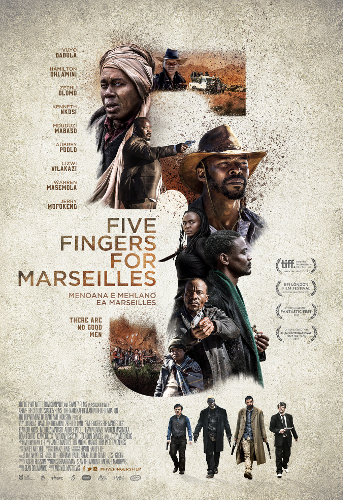
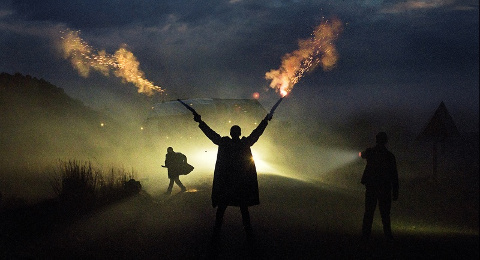
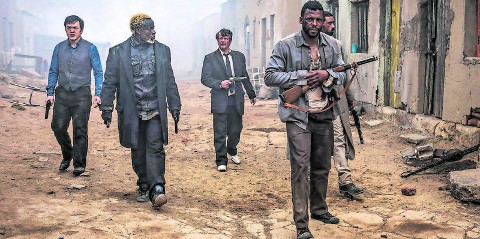

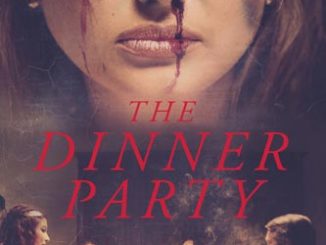
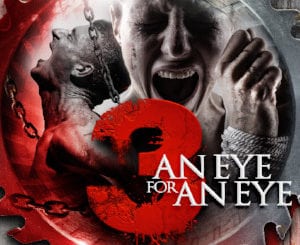
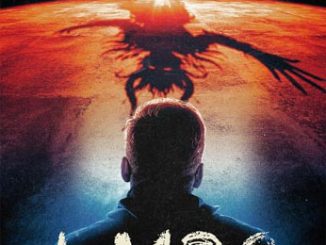
Be the first to comment